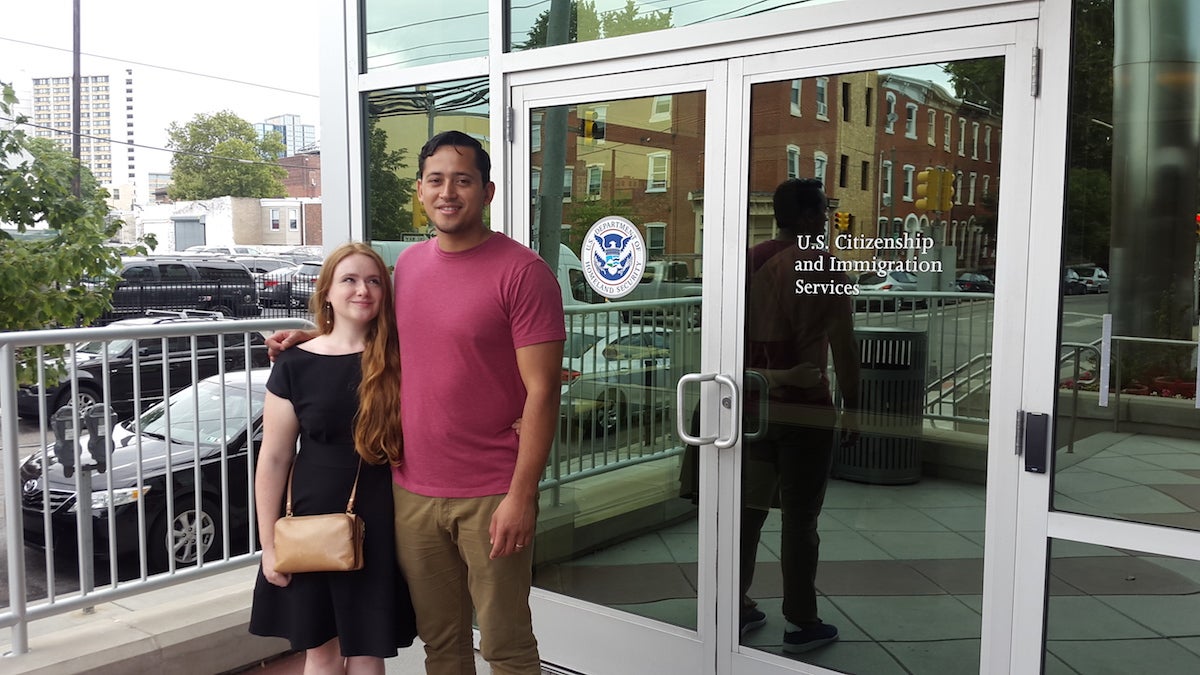After marrying U.S. citizens, undocumented immigrants coming out of the shadows attract ICE scrutiny
Listen 5:23
Lillie Williams and Jonatan Palacios stand outside the offices of U.S. Citizenship and Immigration Services in West Philadelphia after completing an interview to determine the legitimacy of their marriage. (Laura Benshoff / WHYY)
Marriage tests couples in any number of ways.
Lillie Williams and Jonatan Palacios, both 27, have just spent about an hour being quizzed — literally — on their relationship.
Standing outside a gray federal building in West Philadelphia, they described their interview with U.S. Citizenship and Immigration Services, which covered everything from the date they married to the name of their cat.
“Even though I know everything, for some reason I got in the interview and couldn’t remember any of the dates,” said Williams, chuckling. “Usually I get mad at him for not remembering the dates.”
Williams, who is petite and bubbly, and Palacios, who is tall and speaks softly, have been together for seven years and married for two. They’re also what immigration attorneys refer to as a “mixed status” couple. Williams is from Tennessee; Palacios left Honduras when he was 16 and entered the country illegally.
Late last year, they began the process of bringing him out of the shadows, filing what’s called a “petition for an alien relative” or I-130.
Marrying an American citizen is one of the only ways an immigrant living in the U.S. without status can get lawful permanent residency. Before this year, immigration officers would generally leave people on that path to a green card — as long as they didn’t have a criminal record. Now, some who are coming out of the shadows as spouses of U.S. citizens are winding up in jail.
The morning of May 11, immigration officers showed up outside the couple’s home in Haverford, around the time Palacios goes to work at a restaurant. They surrounded his car and arrested him.
It’s not clear how Immigrations and Customs Enforcement found him. ICE declined an interview, but a spokesman said in a statement, “ICE works with United States Citizenship and Immigration Services (USCIS) on certain cases, which may include unexecuted final orders of removal, as determined on a case by case basis.”
USCIS, which processes immigration petitions for the federal government, also provided a statement. While it does share information in certain cases, an agency representative said the office’s primary function “is to interview individuals to determine their eligibility for immigration benefits.”
Shifting emphasis
So far, arrests such as Palacios’ are not a huge trend. During the first three months of 2017, more than 1,300 Pennsylvanians filed petitions to change the status of an immediate relative, which includes spouses. WHYY has confirmed three cases with local ties where ICE arrested a individual who came forward as the spouse of a U.S. citizen.
However, it is a big departure in enforcement practice, according William Stock, a local attorney and former president of the American Immigration Lawyers Association.
“Previously, if a person was filing that petition, it was very often the first steps to getting themselves on the road back to legal,” he said. “Immigration [officers] would very often look at that situation and say, ‘If you’re on the road to legal, let’s not make you a priority.'”
Under immigration law, ICE has the right to arrest immigrants in the country unlawfully, and a successful spousal petition is merely the first step to lawful residency. But, previous presidential administrations encouraged ICE to exercise its discretion to overlook those without criminal records who also had U.S. ties. Now, Stock said, immigration officers are obliged to arrest anyone they come across who has entered the country unlawfully, under executive orders signed by President Donald Trump.
“Does this person have a U.S. citizen relative? Does this person have U.S. citizen children? Do they have a job or business?” Stock said. “None of those things matter. Everyone is a priority for removal.”
Proceeding with caution
Palacios does have one black mark on his immigration record that gives immigration authorities far greater latitude to arrest and deport him. When he was 18, he missed a hearing with an immigration judge in Philadelphia.
While that doesn’t sound like a big deal, it carries a stiff penalty under U.S. immigration law, according to immigration attorney Brennan Gian-Grasso.
“It’s pretty unforgiving. If you a miss a court date, you’re ordered removed,” he said.
This April, one of Gian-Grasso’s clients found himself in nearly the same situation as Palacios. The 33-year-old from Ecuador has a 2-year-old son with his wife, a U.S. citizen of Ecuadorian descent. They filed an I-130 in October. In April, ICE officers showed up at his home.
That man, who didn’t give his attorney permission to be named, had also missed an immigration hearing, “mainly on bad advice,” said Gian-Grasso. He is still detained in York County Prison.
Gian-Grasso says this hasn’t happened to one of his clients before — and it makes him pause. Several other immigration attorneys surveyed said they had no knowledge of immigrants without a criminal record — but with a pending or approved I-130 — being arrested before this year. For those who have, it’s had a chilling effect. Gian-Grasso said he’d still advise future clients to try to change their status — but to proceed with caution.
“If you’re going in with your eyes open, that’s the most important thing, that the client is well-informed about the risks.”
Those risks now include potential arrest.
Through bad times and good
Palacios spent five weeks in prison with the general population, which made him feel like a bad person, he said. He and Williams debated moving to Honduras just to free him.
But Palacios wanted to stick it out — and because he has a good case to stay here as the spouse of a citizen, a judge released him on bond in June. To become a green-card holder, he will have to file a lot more immigration paperwork.
As for jumping through immigration hoops — such as the hour of questions from federal officials — it’s less scary now that his worst fears temporarily came true. “Now that I’m outside and not held in a place, it doesn’t feel painful to do anything,” he said.
“He was mad at me for being nervous,” said Williams. “Like, ‘Look, we went through a lot worse than this, we can take an interview.'”
After all, they passed a much bigger test of their relationship when Palacios was behind bars.
WHYY is your source for fact-based, in-depth journalism and information. As a nonprofit organization, we rely on financial support from readers like you. Please give today.




